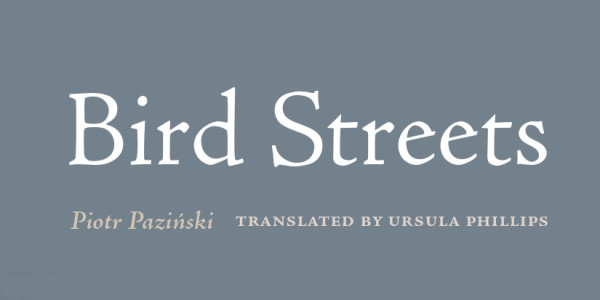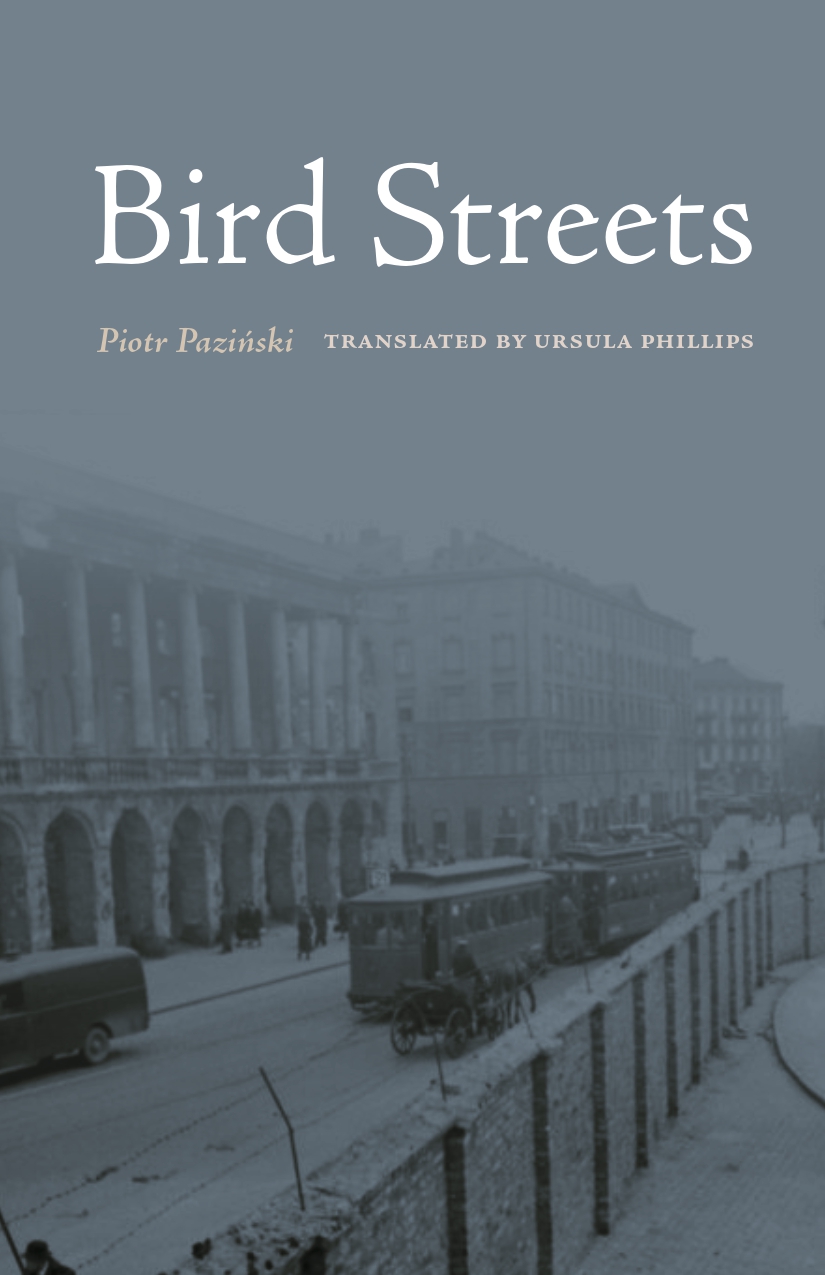Bird Streets
28/02/2023 | Na stronie od 10/02/2023

Source: Institute for Polish-Jewish Studies
A discussion of inter-connecting stories about the echoes of prewar life in the streets of central Warsaw inhabited by Jews before the Second World War and the Holocaust
Bird Streets
with Piotr Paziński, Ursula Phillips, Professor Antony Polonsky and Professor François Guesnet (Chair)
Tuesday 28 February 2023 18.00-19.00 GMT
This event is co-organised with UCL's Institute of Jewish Studies and the Polish University Abroad (PUNO)
On the occasion of the publication of the English translation of Piotr Paziński’s collection of four novellas Bird Streets (Ptasie ulice, 2013), author Piotr Paziński and translator Ursula Phillips discuss the work with Professor Antony Polonsky. Set within the Warsaw ghetto, Bird Streets tells four connecting stories. The novel recaptures vestiges of a culture once abundantly present but now abjectly absent. This “post memory” sparks hidden remnants, echoes, and signs, and clings to underground whisperings. While not a Holocaust memoir, Bird Streets touches all four narrators intrigued by a world not quite lost. This world of generations past continues to speak. The book’s tone is not bleak though. It is wistful and reflective, with irony and gentle humour.
The book is Paziński’s second work of fiction, following The Boarding House (Pensjonat, 2009), which appeared in English in 2018. The eponymous Bird Streets refer to the pre-war names, several still surviving, of streets in the Muranów or Northern District of central Warsaw where many Jews lived before 1939 and which were enclosed in the Ghetto in November 1940. Following the forced transportation of the Jewish residents to extermination camps and the crushing of the Ghetto Uprising (19 April-16 May 1943), the area encompassed by the Bird Streets was razed to the ground. Hidden remnants, echoes and signs can still be found, especially underground.
Piotr Paziński is a literary critic, philosopher, translator, and novelist of Jewish heritage who lives in Warsaw and writes in Polish. From 2000 to 2019, Paziński was editor-in-chief of Midrasz, a monthly journal published in Warsaw on Jewish culture, religion, literature, and history including Polish/Jewish relations past and present. He is author of two volumes of critical essays: Torn and Frayed Reality (Rzeczywistość poprzecierana, 2015), which includes essays on Joyce, Kafka, Borges, Paul Celan and Polish-Jewish writers of the interwar period; and Fake Realities (Atrapy stworzenia, 2020) about dolls, dummies, wax-figure cabinets, androids and mannequins in 19th-century Western culture. Paziński also translates from Hebrew into Polish. In 2017 he received the Tadeusz Boy- Żeleński Prize awarded by the City of Gdańsk for his translation of stories by Shmuel Yosef Agnon (1888-1970).
Ursula Phillips is a British translator of Polish literary and academic works, and an historian of Polish literature specializing in women of the 19th and 20th centuries. Recent translations include novels by interwar writer Zofia Nałkowska, Choucas (1927) and Boundary (1935), which received the Found in Translation Award 2015 and the PIASA (Polish Institute of Arts and Sciences of America) Wacław Lednicki Award 2017 respectively. Her most recent translations include Grzegorz Niziołek’s The Polish Theatre of the Holocaust (2019) and Another Canon: The Polish Nineteenth-Century Novel in World Context, edited by Grażyna Borkowska and Lidia Wiśniewska (2020). She is currently translating the 1000-page sci-fi-cum-alternative-history epic Ice (2007) by contemporary author Jacek Dukaj.
Antony Polonsky is Chief Historian of the POLIN Museum of the History of Polish Jews, Warsaw and Emeritus Professor of Holocaust Studies at Brandeis University. Until 1991 he was Professor of International History at the London School of Economics and Political Science. He is co-chair of the editorial board of Polin: Studies in Polish Jewry, author of Politics in Independent Poland (1972), The Little Dictators (1975), The Great Powers and the Polish Question (1976); co-author of A History of Modern Poland (1980) and The Beginnings of Communist Rule in Poland (1981) and co-editor of Contemporary Jewish writing in Poland: an anthology (2001) and The neighbors respond: the controversy over the Jedwabne Massacre in Poland (2004). His most recent work is The Jews in Poland and Russia, volume 1, 1350 to 1881; volume 2 1881 to 1914; volume 3 1914 to 2008 (2010, 2012), published in 2013 in an abridged version The Jews in Poland and Russia. A Short History.
François Guesnet is Professor of Modern Jewish History at University College London. He specializes in Eastern European Jewish History and is co-chair of the editorial board of Polin: Studies in Polish Jewry. His book publications include Polnische Juden im 19. Jahrhundert (Vienna, Cologne, 1998), and, as editor, Warsaw. The Jewish Metropolis (2015, paperback 2017). A collected volume Sources on Jewish Self-Government in the Polish Lands from Its Inception to the Present is forthcoming (Boston, Leiden: 2022).

Registration: Registration is free via Eventbrite. Please click the REGISTER button below and fill in your details on the Eventbrite site. Once you have registered, you will receive your Zoom link with your Eventbrite confirmation. This zoom link will be sent to you once again just before the lecture takes place.
Please consider making a donation to the IPJS, to help us continue to provide programmes such as this. Just click the DONATE button below.